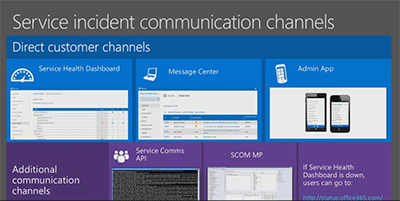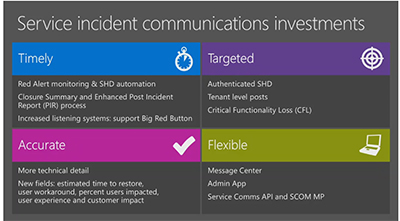News
Office 365 Service APIs and Push Notifications Go Live
Microsoft is adding two Office 365 improvements to improve service communication.
One of the improvements concerns the company's Office 365 Admin apps. These apps display the service's health status on phones. They also allow IT pros to take some limited actions, such as the ability to change PINs. More details about them can be found in this review.
Push Notifications
Office 365 Admin apps can now receive push notifications about service incidents from Microsoft, according to Microsoft's announcement on Monday. This alert system is currently available to Microsoft's "first release" Office 365 Admin app testers on Android, iOS and Windows smartphones. A "worldwide release" will follow later, according to the announcement.
Microsoft is also planning to establish future push notifications capability for its Office 365 Message Center, which is another way IT pros can monitor Office 365 services. That capability will arrive in "the third quarter" of this year.
Office 365 push notifications eventually will be customizable. IT pros will be able to specify the notifications that they want to receive, based on a specific service, such as SharePoint Online or Exchange Online. They also will be able to select the notification medium, such as text message or e-mail. However, Microsoft did not indicate when customization options will be available.
Service Comm APIs
The second improvement is the "preview"-stage availability of Office 365 Service Communications APIs. The APIs will open up some Office 365 reporting capabilities.
The APIs are mostly of benefit for Microsoft's solution partners, which can now start building their management apps to surface Office 365 service incident information. Those partners currently include "BetterCloud, ENow, Cogmotive and Exoprise," according to Microsoft's announcement. However, the APIs also allow customization options for organizations, too, Microsoft indicated.
Other Improvements
Microsoft's main Office 365 notification tool for IT pros is its Service Health Dashboard. It also has the Office 365 Message Center and the Office 365 Admin apps for getting service incident information. Other capabilities include the Service Communications API, System Center Operations Manager and a Web portal, according to a slide presented during a May Ignite session on the topic:
 [Click on image for larger view.]
Figure 1. Office 365 service incident reporting capabilities. Source: Microsoft Ignite 2015 session.
[Click on image for larger view.]
Figure 1. Office 365 service incident reporting capabilities. Source: Microsoft Ignite 2015 session.
The Service Health Dashboard gets updated on an hourly basis and holds incident data from the last 30 days. During the Ignite session, Katy Olmstead, a senior operations manager at Microsoft, said that "if we deviate from that [hourly] update cadence, we'll let you know." She added that the Dashboard sometimes can show "false positives" on service outages, but Microsoft prefers to let people know they are investigating possible incidents. Microsoft is now issuing closure summaries at the end of an incident, instead of waiting five days to issue them, she added.
Microsoft has recently added some reporting improvements to the Dashboard. They include information about "expected user experience, potential workarounds, estimated time to restoration and initial root cause analysis," according to Microsoft's announcement.
Microsoft also recently introduced "intelligent error messages," which go directly to end users when it appears that access to a service may get interrupted. Intelligent error messages currently go to SharePoint Online users, but Microsoft plans to support "other Office 365 workloads" in "the coming months," according to the announcement.
Microsoft is working on a future notification capability specific to Office 365 tenants. It's called "proactive notification." Under this scheme, IT pros will get specific reports, such as when end users are trying to access e-mail with outdated Outlook clients.
An outline of Microsoft's future investments for reporting Office 365 service incidents was shown in this Ignite session slide:
 [Click on image for larger view.]
Figure 2. Microsoft's service communications investments for Office 365. Source: Microsoft Ignite 2015 session.
[Click on image for larger view.]
Figure 2. Microsoft's service communications investments for Office 365. Source: Microsoft Ignite 2015 session.
About the Author
Kurt Mackie is senior news producer for 1105 Media's Converge360 group.